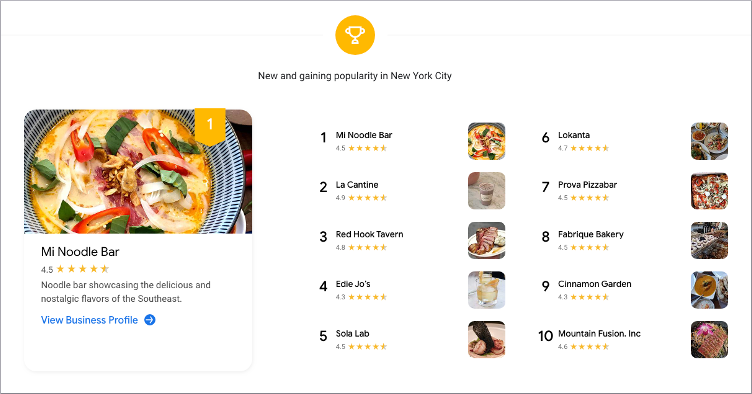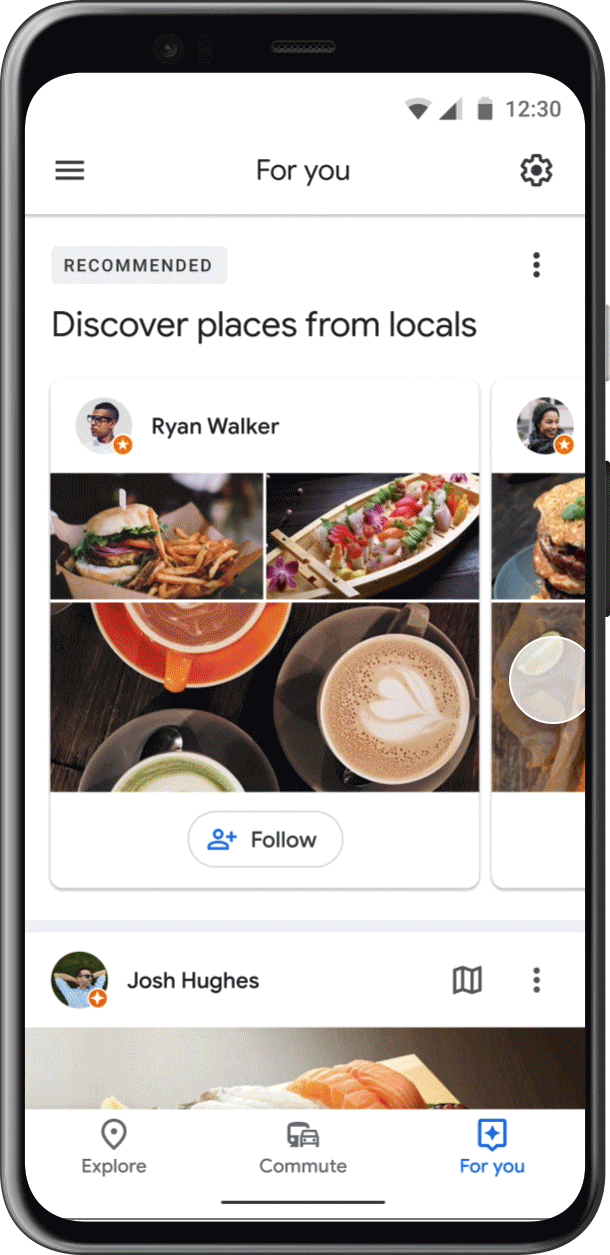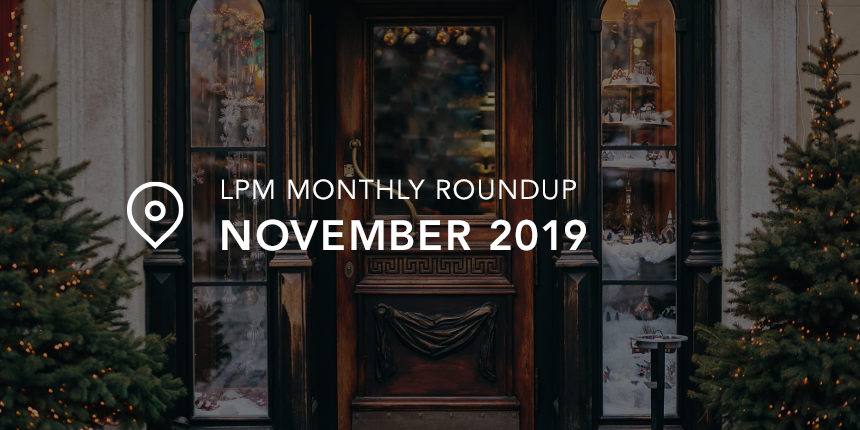As 2019 draws to a close, Google is looking ahead to 2020 with its updates. While some have taken effect immediately, the majority of November’s updates are tests and pilots on what will be fully rolled out in 2020. For online marketers, staying on top of the coming trends is key—you don’t want to be playing catch-up when the latest Google features are in full swing and users are expecting them to already be optimised.
Local algorithm fluctuation
Google performs regular algorithm updates every two months or so. Lately they have been announcing when theses routine updates occur, but one is suspected to have taken place in November without prior warning. While changes generally range from minor to unnoticeable, this most recent update seems to have had a noteworthy negative impact on Google’s results pages. Local search engine experts have collectively noticed this unannounced update as their clients’ rankings took heavy dips, seemingly being replaced by spammy listings.
This algorithm fluctuation seems like an experiment gone wrong—one that Google will hopefully be swift to rectify. In the interim, there is little that businesses can do to regain their rankings. Under-optimised and spam-laden websites have been given a boost, so following SEO best practices clearly is not the way to work around this change. With enough of the SEO community making waves about this issue, hopefully it will be fixed quickly.
Google to stop indexing Flash content and punish slow pages
Flash has been on the decline for years, with Chrome already blocking all Flash files by default. In 2020, Google will stop indexing Flash-dependent websites altogether. Just as Google spent years warning websites to convert from HTTP to HTTPS, this coming year will be the final one where users can view Flash pages.
In addition, Google is testing a new “slow page speed” warning. Whether due to memory-intensive Flash files or other site speed issues, Google is planning to preemptively warn users before they click on a website that Google deems below adequate page speeds.

This new UI may cause users to abandon the click and opt for a faster-loading website instead. Google has confirmed in previous studies that any mobile website that takes more than 2.5 seconds to load loses about 53% of users. With a preemptive warning in place, that number can be expected to grow much higher. Site speed will become more important than ever once Google implements this change.
GMB service area businesses capped at 20
Google announced that “service area businesses are now limited to having a maximum of 20 service areas per business.” This is applicable to businesses like plumbers and house cleaners who don’t have a brick-and-mortar location but rather are service area businesses.
What if you need more? Google recommends expanding existing ones to cover larger geographic areas: “You can set your service area based on a combination of entire cities, districts, postal codes, or other areas that you serve.”
What if you already have over 20 service areas listed? Google said they’ll be consolidating them—and we’ll have to wait and see exactly what that means.
Google Duplex to confirm business details
Google Duplex (the AI chat agent that can arrange appointments over the phone) will launch in New Zealand as part of a limited test pilot to confirm business holiday hours for a small group of local businesses. This will be the first time that Duplex has expanded outside of the U.S., along with a newly revealed functionality of the AI suite. This shows that Google intends to use Duplex for more serious data gathering and other business functionalities beyond providing convenience for consumers.

Image source: Google
For businesses trying to stay optimised and rank well on Google and other directories, having accurate names, addresses, and phone numbers won’t be enough in the coming years. Even corroborating information and citations from other directories won’t hold as much sway as they once did. Business owners and agencies will have to rely on SEO tactics and better user experiences that can’t be accomplished through AI. Businesses will have to solve the entire local search user journey and not just focus on citation management.
Reputation management, local Google Posts, voice search optimisation, and other ways to improve the user experience that aren’t just basic listing information will be the key to success. As Google becomes better at making skeletal listings for businesses without their input, businesses will have to do a lot more to stand out from the crowd.
Google highlights Local Favorites and adds a For You tab
In another new feature that Google is testing, Google is highlighting certain restaurants as “Local Favorites.” This limited-run feature is currently only taking place in Chicago, Los Angeles, and New York City.
Google has not specified how one would qualify as a Local Favorite other than that it would be in the “top 5% of restaurants.” What this means, however, is that Google is hyper-focused on local and is trying to use its Google Maps platform as a more reliable source for restaurant recommendation and promotion. In what may be a move to get users off of competing websites like Yelp and TripAdvisor, Google is ramping up efforts to make its Google Maps recommendations section a place that more users utilise. Google also revealed that businesses receive a recognition package after earning Local Favorite status, which comes complete with window stickers.
In addition to Local Favorites, Google is also implementing “Rising Stars” and “Hidden Gems.” The information we have been given on these suggests that Rising Stars will be geared towards newer business listings, while Hidden Gems will be those with few but very positive reviews.

Image source: Google
Out of the gate, local businesses should focus on their reputation management strategy. Replying to all reviews, good or bad, has been shown to increase star ratings, encourage a higher volume of reviews, and encourage more reviews that include a body of text. If Google sees a new restaurant opening, there is little doubt it will prefer businesses with a large volume of text-heavy reviews compared to those with five-star reviews but no copy.
Another feature accompanying highlighted restaurants is Google’s “For You” tab, a pilot program where Local Guides provide recommendations to users. Local Guides are regular people who avidly contribute reviews, photos, and other information to Google Maps. As Local Guides are worldwide, the For You pilot is appearing in more cities than Local Favorites, starting first in Bangkok, Delhi, London, Mexico City, New York City, Osaka, San Francisco, São Paulo, and Tokyo.

GIF source: Google
Users who find Local Guides especially helpful will also be given the option to follow those users. Much like a social media platform, users who prefer specific local critics will be able to filter their personalised recommendations to the Local Guides that they most share their tastes with.
That’s a wrap on our monthly LPM roundups for 2019! Stay tuned in 2020 for the latest LPM updates. In the meantime, if you have any questions about managing and optimising your local online presence, contact DAC.




